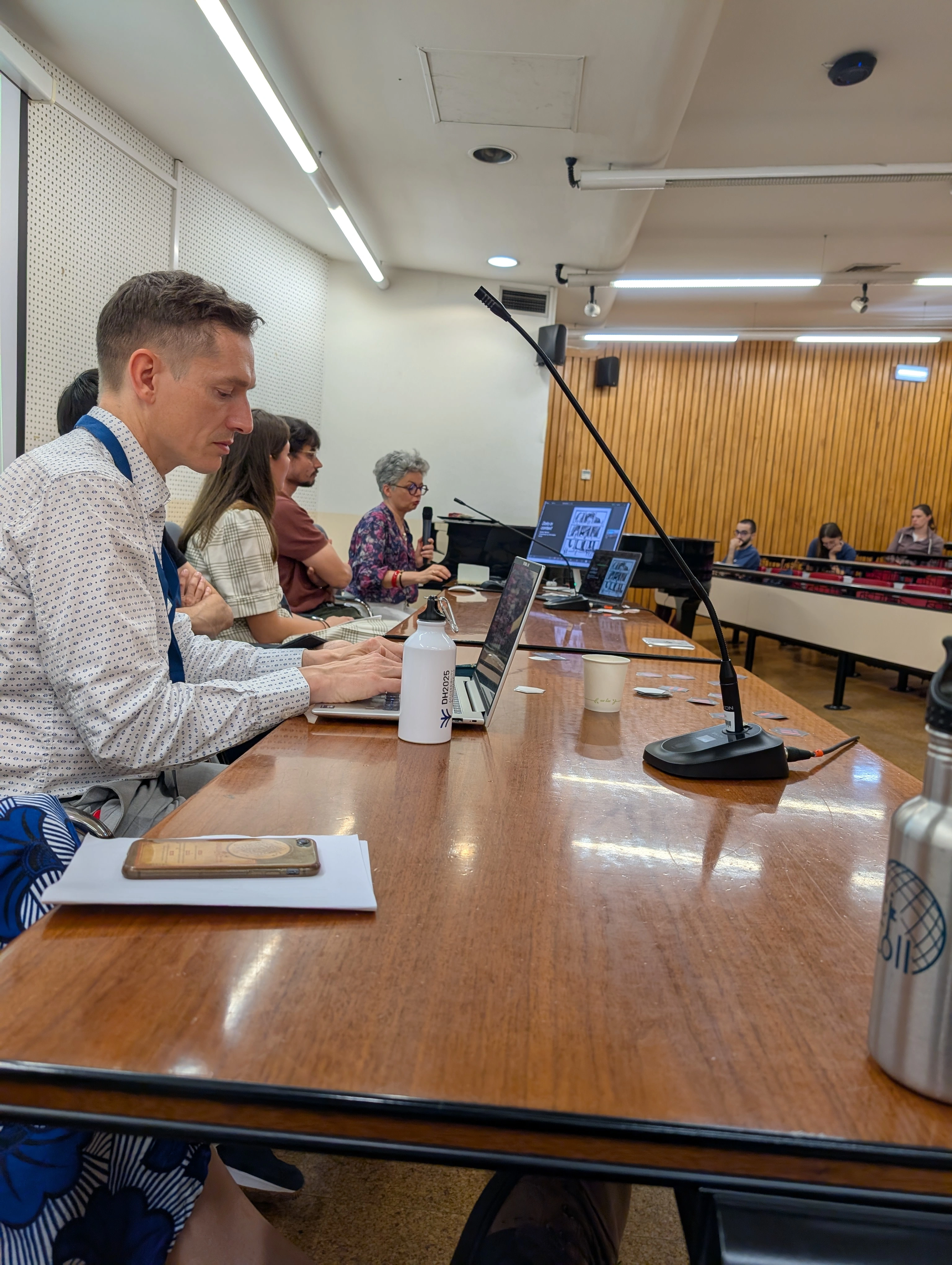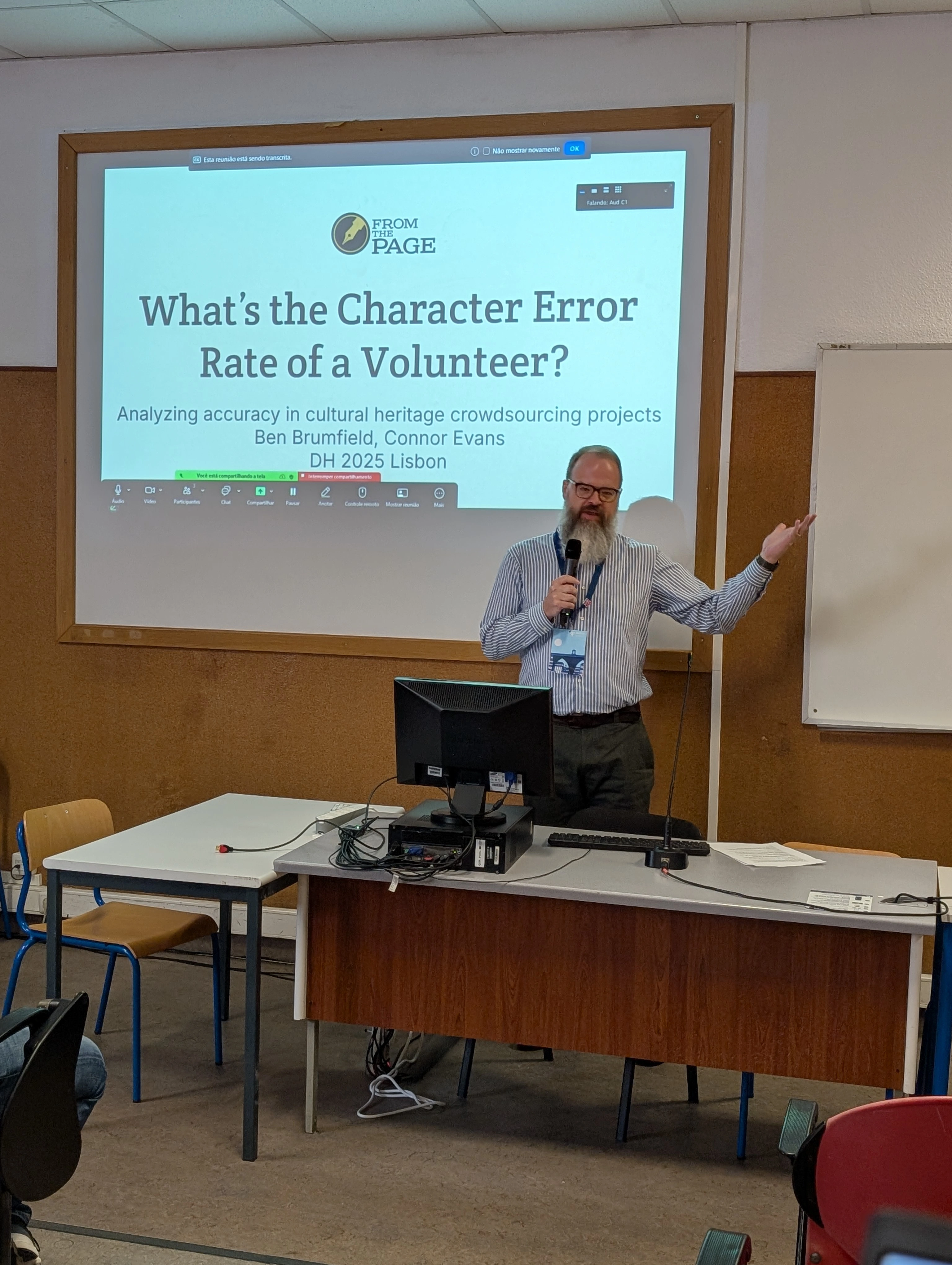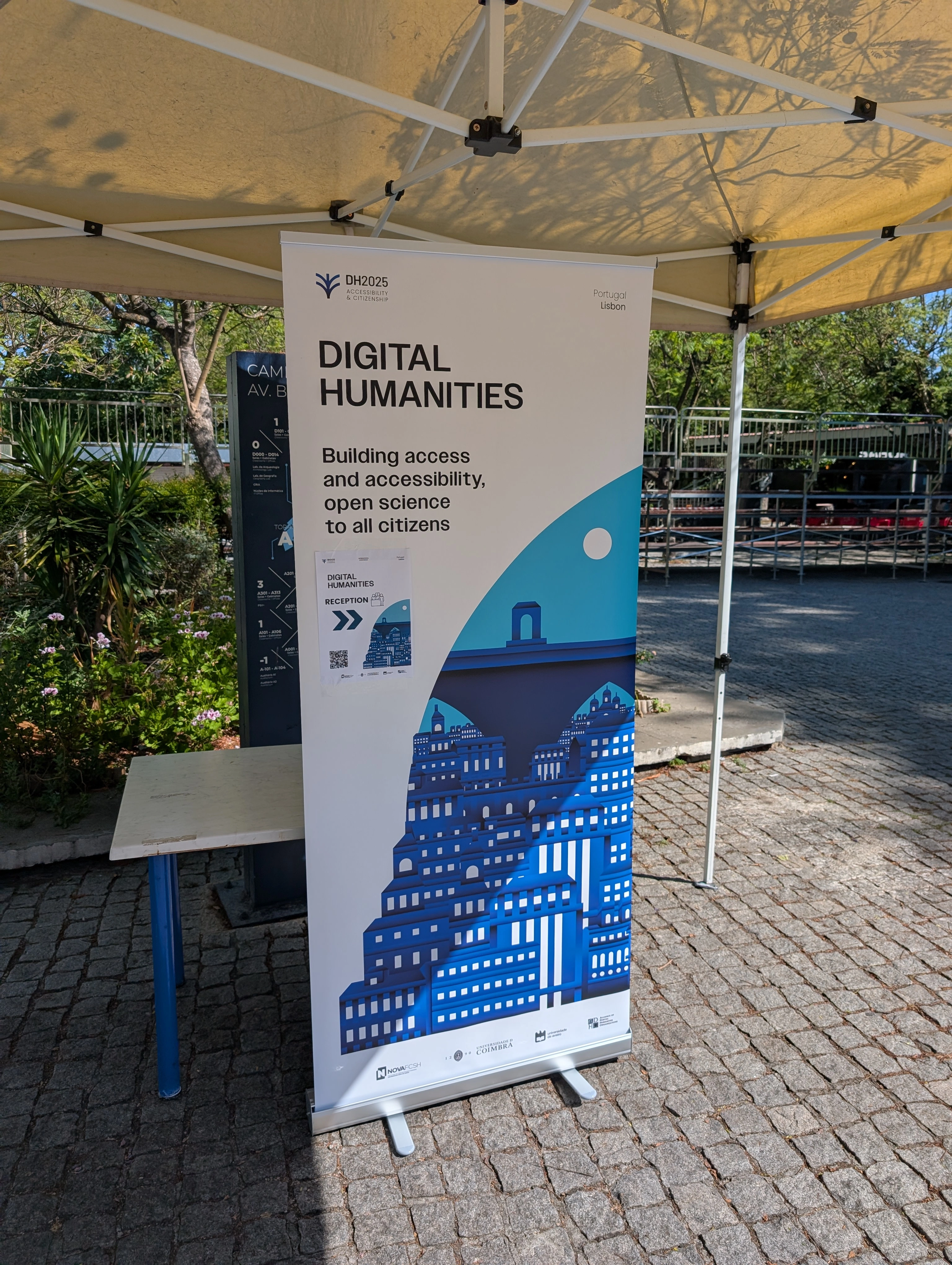 It was great to be part of the panel, “A Decade of IIIF: Advancing Open Science and Accessibility through Interoperable Digital Heritage” organized by Jacob Hart (Université Rennes) at the Digital Humanities 2025 (DH2025) conference which took place in Lisbon, Portugal, July 14-18, 2025.
It was great to be part of the panel, “A Decade of IIIF: Advancing Open Science and Accessibility through Interoperable Digital Heritage” organized by Jacob Hart (Université Rennes) at the Digital Humanities 2025 (DH2025) conference which took place in Lisbon, Portugal, July 14-18, 2025.
DH2025 is the annual conference of the Alliance of Digital Humanities Organizations (ADHO). The theme this year was “Building Access and Accessibility, Open Science to all Citizens” and brought together nearly 1,000 attendees from around the world. Though the conference was hybrid, the majority of participants were able to attend in person at the facilities of the Faculty of Social Sciences and Humanities, Universidade NOVA de Lisboa. Additional hosts of the conference included the University de Coimbra and the University of Aveiro.
A Decade of IIIF
The IIIF panel was chaired by Dominique Stutzmann, CNRS-IRHT / Humboldt-Universität zu Berlin with speaker introductions by Clarisse Bardiot, Université Rennes. The panel discussed many aspects of IIIF and highlighted a number of implementations. Speakers included IIIF contributors and DH practitioners who critically examined the framework’s role in contemporary scholarship. They explored the community-driven nature of IIIF and the development cycles of its evolving APIs. Discussions focused on how IIIF enables interoperability, enhances accessibility, and integrates with FAIR principles in diverse research contexts.
There was also coverage of the recent technical advancements that broadened IIIF capabilities and how these developments position IIIF as a multimodal standard, supporting a variety of digital objects such as maps, audiovisual media, and 3D models. Practical examples by the panel showcased how these innovations are applied in research. My presentation was “Technology, Community, and Consortium: The International Image Interoperability Framework (IIIF)” and led off the panel. The other contributions were:
- Disseminating and implementing IIIF over the long term: the case of Biblissima, Régis Robineau, ÉquipEx Biblissima+, Campus Condorcet
- IIIF and scholarly publications in visual studies the PerVisum Project, Margaux Faure, Institut national d’histoire de l’art (INHA) & Juliette Hueber, Laboratoire InVisu, (CNRS-INHA)
- IIIF APIs for image processing based humanities, Dominique Stutzmann, CNRS-IRHT / Humboldt-Universität zu Berlin
- IIIF and Multimodal Digital Heritage, Jacob Hart & Clarisse Bardiot, Université Rennes
Other Sessions
The opening keynote, “Automating the past: Artificial Intelligence and the next frontiers of Digital History” by Javier Cha (The University of Hong Kong), set the tone for the conference with a great discussion on the role of AI in digital humanities and digital history. The multi-track program made it hard to choose which sessions to attend. At the risk of leaving out comments on well-done and informative presentations, I’ll just mention a few:
 “Digital Mapping & Crowdsourcing for Cultural Heritage & Dialect Studies”; “Multiple Digital Approaches: Metadata, Crowdsourcing, HTR, Retrocomputing and Inclusion” (which included a presentation by Ben Brumfield of From the Page, “What’s the Character Error Rate of a Volunteer? Analyzing accuracy in cultural heritage crowdsourcing projects” that was very insightful); “The AVAnnotate Project and Creating Access to Culturally Sensitive AudioVisual Collections”; and “Digital Tools and Techniques for Cultural Heritage and History” (which included a presentation from the British Library team on “Radically inclusive software development for digital cultural heritage”).
“Digital Mapping & Crowdsourcing for Cultural Heritage & Dialect Studies”; “Multiple Digital Approaches: Metadata, Crowdsourcing, HTR, Retrocomputing and Inclusion” (which included a presentation by Ben Brumfield of From the Page, “What’s the Character Error Rate of a Volunteer? Analyzing accuracy in cultural heritage crowdsourcing projects” that was very insightful); “The AVAnnotate Project and Creating Access to Culturally Sensitive AudioVisual Collections”; and “Digital Tools and Techniques for Cultural Heritage and History” (which included a presentation from the British Library team on “Radically inclusive software development for digital cultural heritage”).
Though there were many interesting quotes over the course of the week, two that resonated with me were: “History is important because it shows the past was different which means the future can be different” by Till Grallert (Humboldt-Universität zu Berlin) in the session, “The global state of digital history: Establishing data culture(s) in uncertain times” and “Make digital humanities more human” by Francisco Dias Nabais in his talk, “Digital Humanities in Museums: Ethics, Data Histories, & Citizen Science”.
Final Thoughts on DH2025
DH2025 provided a wonderful opportunity to meet new potential collaborators and share ideas in person with longtime colleagues – including IIIF-C Executive Committee members Neil Fitzgerald (British Library) and David Newbury (J. Paul Getty Trust). In talking with attendees, there was an interesting mix of those who were very familiar with IIIF and found it a key infrastructure to support the work of digital humanities and those who had never heard of IIIF. Going forward, I look forward to continued conversations with participants in the Alliance of Digital Humanities Organizations to help expand the implementation of and uptake of IIIF to support digital humanities.

